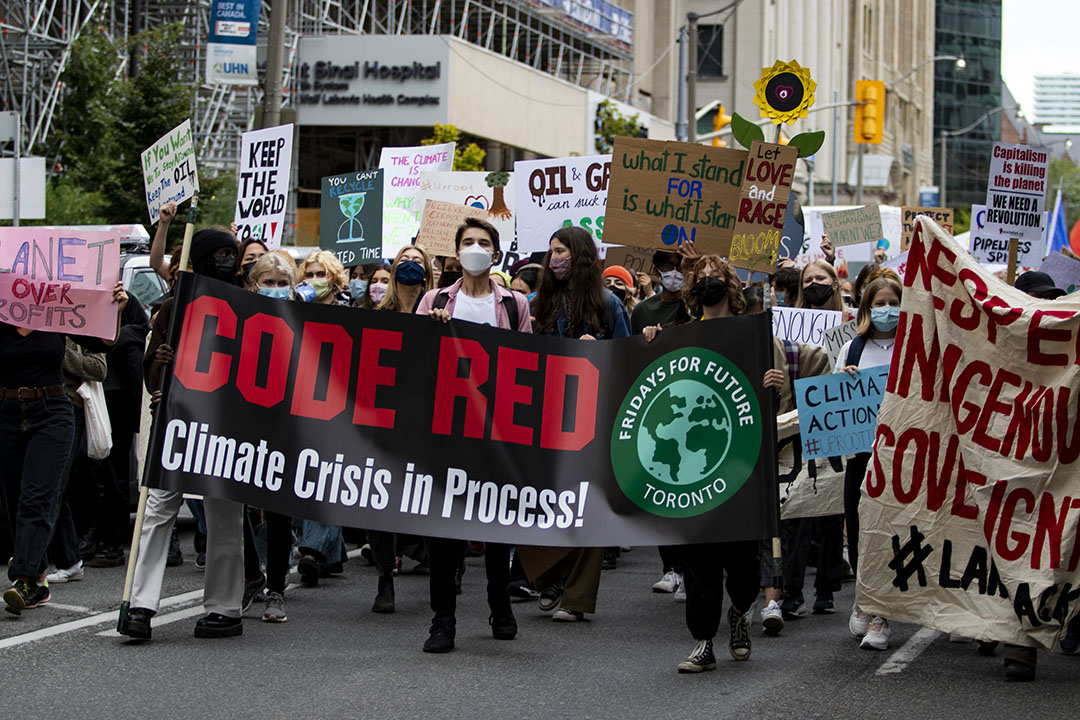On September 24, protesters participated in the global climate strike organized by Toronto’s Fridays for Future, rallying alongside people in cities across the world for action against climate change. Beginning with a rally in Queen’s Park outside the Legislative Assembly of Ontario, protesters marched around University, Queen, and Bay, circling back to Queen’s Park and ending with music. This year’s theme was #UprootTheSystem.
In their speeches and in interviews with The Varsity, protesters emphasized the importance of coming out to protest, saying they felt that, despite the pandemic, it was important to show that climate change is still an important issue. Bigger themes addressed by the protest included the intersections of climate change, housing, and issues affecting Indigenous people.
COVID-19 and the need for a protest
Protesters said they felt it was important to emphasize climate justice even during the pandemic.
Griffin Schwartz, a PhD student at U of T, said he felt comfortable attending since he is vaccinated and the protest was outdoors.
Second-year U of T student Patricia Meyer said in an interview with The Varsity that it was important to come out in such large numbers “to show that even in the midst of a pandemic, there are other issues that still need to be addressed.” She added that she felt that the pandemic has sometimes overshadowed other important issues, especially at its start.
She added that climate justice is closely intertwined with other issues, such as justice for Indigenous peoples in Canada, COVID-19, and health care, since the climate affects each of these issues.
U of T students Angel Bella and Caitie Ciampaglia said they believe it’s important to show how necessary climate action still is, despite other things happening in the world.
“I think that it proves that… climate action is still at the forefront of a lot of people’s concerns,” said Ciampaglia.
Federal election
Climate change was a hot topic during the 2021 federal election, with each party laying out their plan on how to address climate change.
Meyer said that, while she was glad that climate change became a “major talking point,” she still felt that none of the parties’ platforms sufficiently addressed the issue. She pointed to the New Democratic Party (NDP) as the party with the best platform, though she still noted that their policies don’t go far enough to address climate change and other issues.
Ciampaglia said that she was somewhat disappointed with the election results, since she feels Liberal party’s policies haven’t sufficiently addressed climate change.
Ciampaglia said, “I hope that they take this opportunity to really turn things around. I’m not super optimistic, though, because of their past record, but we’ll see.”
Rivka Goetz, a fourth-year U of T student, expressed a more hopeful view about the election results. She said she did see voters were motivated by the climate crisis and candidates were willing to take a stronger stance calling for change.
“You know, we’re still in a very status quo kind of place where not much is changing,” said Goertz. “But I think there is hope moving forward.”
Intersectionality
Based on the idea of #UprootTheSystem, the global climate strike took a focus on the intersectionality of climate change that is rooted in systems such as colonialism, emphasizing how the Global North has contributed to global emissions. This narrative is marked by the interplay of climate change’s effects on Indigenous peoples, varying climate responsibilities, climate reparations, and social impacts on minority groups.
Schwartz, recognizing the imbalanced impact of what he described as “this cataclysmic impending event” also shared his belief that while climate change won’t affect him directly as much, it will “destabilize everything and create more refugees.”
Another speaker spoke about the food systems controlled by large corporations whose “function is to exploit the land and to kill the land for profit, not for food” which is “far from the way that Indigenous peoples and people of colour would originally live in unison with the land.” They stated that as much as these corporations would like to blame consumers, they are responsible for driving these systems, and what we can collectively do as individuals is “stop funding these large corporations in power that are destroying the planet.”
Goetz echoed the need for a systematic approach to address the climate crisis, calling for action in solidarity with other social justice movements. She expressed hope that climate action could shift from something that only focuses on specific issues to a coalition of justice movements.
“We do have a very specific goal in getting the university to divest from fossil fuels,” said Goetz. “But we also recognize the history of divestment and on the ongoing movements on things like Boycott, Divest, Sanction (BDS), [and] the history of the South African apartheid divestment movement.”
Goetz believes that divestment is rooted in movements against racism and colonialism.“It’s about stopping all forms of oppression and working together [in coalition], movement building, solidarity building, so that we can create a safer, better future,” said Goetz.
Divestment
In an interview with The Varsity, Evelyn Austin discussed the importance of fossil fuel divestment. Austin graduated from U of T two years ago and currently works with the group Banking on a Better Future to pressure large companies to divest from fossil fuels. She volunteered as a marshal for the protest.
Austin said that pressuring large banks like the Royal Bank of Canada, TD, and Scotiabank to divest from fossil fuels is important, since they’re the ones that provide loans for pipelines on Indigenous land. The group advocates for more community-led initiatives, as well as decreasing or stabilizing energy demand.
— With files from Marta Anielska


